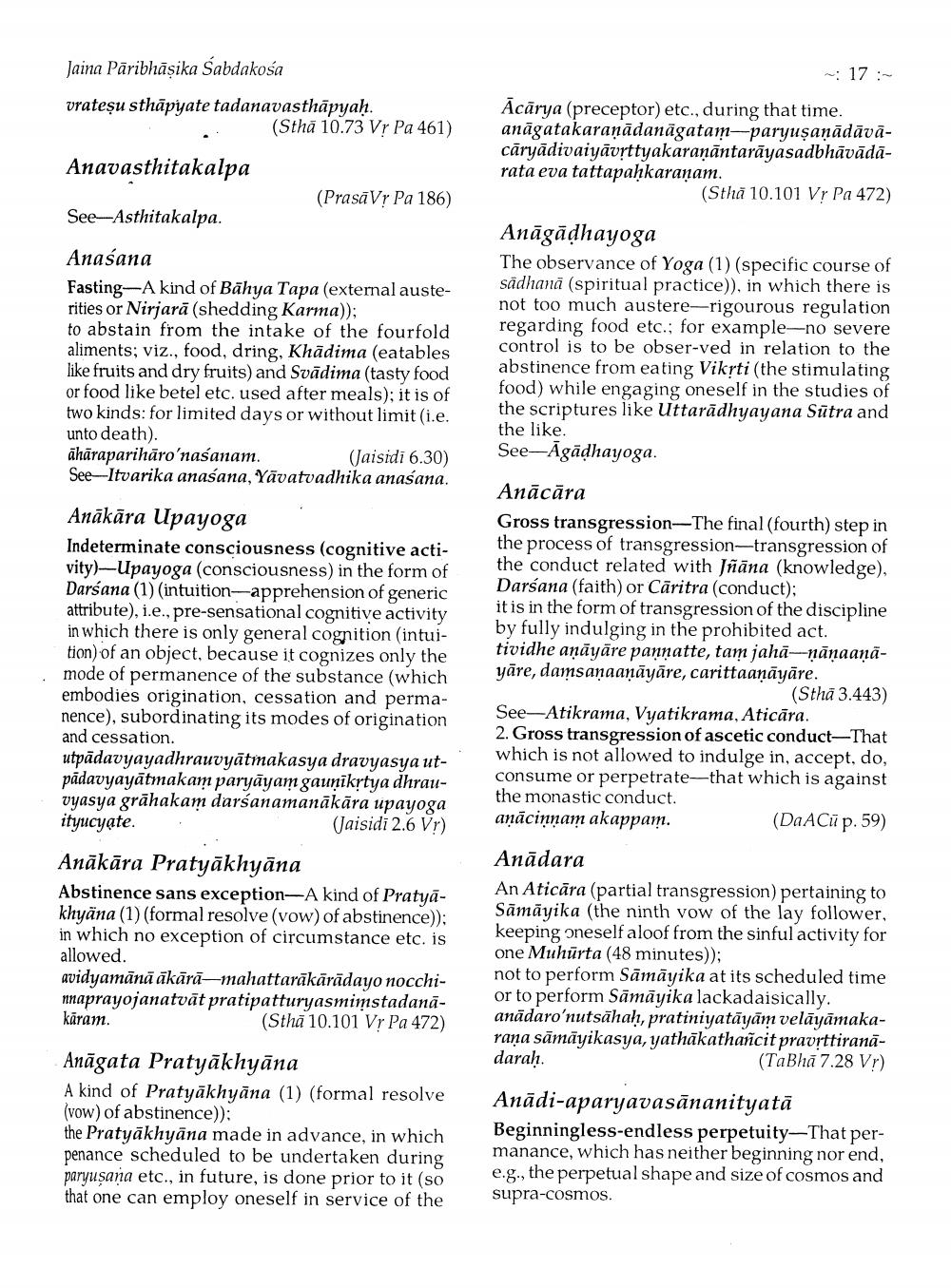________________
Jaina Paribhāṣika Sabdakosa
vrateṣu sthāpyate tadanavasthāpyaḥ. (Sthä 10.73 Vr Pa 461)
Anavasthitakalpa
See-Asthitakalpa.
(PrasaVr Pa 186)
Anasana
Fasting-A kind of Bahya Tapa (extemal austerities or Nirjara (shedding Karma));
to abstain from the intake of the fourfold aliments; viz., food, dring. Khadima (eatables like fruits and dry fruits) and Svadima (tasty food or food like betel etc. used after meals); it is of two kinds: for limited days or without limit (i.e. unto death).
Ahirapariharo'nasanam. (Jaisidi 6.30) See Itvarika anasana, Yavatvadhika anaśana.
Anakara Upayoga
Indeterminate consciousness (cognitive activity)-Upayoga (consciousness) in the form of Darsana (1) (intuition-apprehension of generic attribute), i.e., pre-sensational cognitive activity in which there is only general cognition (intuition) of an object, because it cognizes only the mode of permanence of the substance (which embodies origination, cessation and permanence), subordinating its modes of origination and cessation.
utpadavyayadhrauvyatmakasya dravyasya utpadavyayatmakam paryayam gaunikṛtya dhrauvyasya grahakam darśanamanäkära upayoga ityucyate. (Jaisidi 2.6 Vr)
Anäkära Pratyäkhyāna
Abstinence sans exception-A kind of Pratyakhyāna (1) (formal resolve (vow) of abstinence)): in which no exception of circumstance etc. is allowed.
avidyamänä äkärä-mahattarākārādayo nocchinaprayojanatvät pratipatturyasmimstadana(Sth 10.101 Vr Pa 472)
kāram.
Anāgata Pratyakhyāna
A kind of Pratyäkhyāna (1) (formal resolve (vow) of abstinence)):
the Pratyakhyana made in advance, in which penance scheduled to be undertaken during paryusana etc., in future, is done prior to it (so that one can employ oneself in service of the
~:17:~
Acarya (preceptor) etc., during that time. anāgatakaraṇadanagatam-paryuṣaṇādāvācāryadivaiyavṛttyakaraṇāntarāyasadbhāvādārata eva tattapaḥkaraṇam.
(Sthd 10.101 Vr Pa 472)
Anägäḍhayoga
The observance of Yoga (1) (specific course of sadhana (spiritual practice)), in which there is not too much austere-rigourous regulation regarding food etc.; for example-no severe control is to be obser-ved in relation to the abstinence from eating Vikṛti (the stimulating food) while engaging oneself in the studies of the scriptures like Uttaradhyayana Sūtra and the like.
See-Agadhayoga.
Anācāra
Gross transgression-The final (fourth) step in the process of transgression-transgression of the conduct related with Jääna (knowledge). Darsana (faith) or Caritra (conduct);
it is in the form of transgression of the discipline by fully indulging in the prohibited act. tividhe andyare pannatte, tam jahā-ṇāṇaaṇāyare, damsanaaṇāyāre, carittaandyäre.
(Stha 3.443)
See-Atikrama, Vyatikrama, Aticăra. 2. Gross transgression of ascetic conduct-That which is not allowed to indulge in, accept, do, consume or perpetrate-that which is against the monastic conduct. anacinnam akappam.
(DaACâ p. 59)
Anādara
An Aticara (partial transgression) pertaining to Sämäyika (the ninth vow of the lay follower. keeping oneself aloof from the sinful activity for one Muhurta (48 minutes));
not to perform Sämäyika at its scheduled time or to perform Sämäyika lackadaisically. anadaro'nutsähah, pratiniyatäyäm veläyämakarana sämäyikasya, yathakathañcit pravṛttiranadarah. (TaBha 7.28 Vr)
Anädi-aparyavasananityatā Beginningless-endless perpetuity-That permanance, which has neither beginning nor end, e.g., the perpetual shape and size of cosmos and supra-cosmos.




